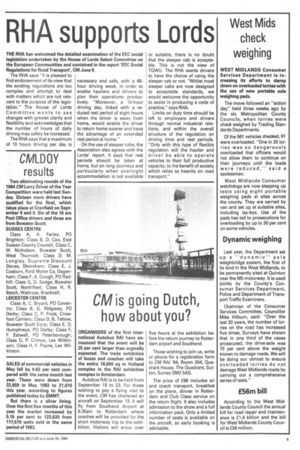RHA supports Lords
Page 7

If you've noticed an error in this article please click here to report it so we can fix it.
THE RHA has welcomed the detailed examination of the EEC social legislation undertaken by the House of Lords Select Committee on the European Communities and contained in the report 'EEC Social Regulations for Road Transport', CM June 9.
The RHA says "it is pleased to find endorsement of its view that the existing regulations are too complex and attempt to deal with matters which are not relevant to the purpose of the legislation." The House of Lords Committee wants to see changes with greater clarity and flexibility and acknowledges that the number of hours of daily driving may safely be increased.
The RHA says that a maximum of 10 hours driving per day is necessary and safe, with a 48hour driving week, in order to enable hauliers and drivers to plan their operations productively. "Moreover, a 10-hour driving day, linked with a reduced rest period of eight hours when the driver is away from home, would enable the driver to return home sooner and have the advantage of an extended rest period at home."
On the use of sleeper cabs, the Association also agrees with the Lords' report. It says that rest periods should be taken at home, but on long journeys and particularly when overnight accommodation is not available or suitable, there is no doubt that the sleeper cab is acceptable. This is not the view of TGWU. The RHA wants drivers to have the choice of using the sleeper cab or not_ "Whilst most sleeper cabs are now designed to acceptable standards, we would welcome the opportunity to assist in producing a code of practice," says RHA.
Limits on duty time should be left to employers and drivers through normal industrial relations, and within the overall structure of the regulation on driving time and rest periods. "Only with this type of flexible regulation will the haulier and driver be able to operate vehicles to their full productive capacity, to the benefit of society which relies so heavily on road transport."




























































































